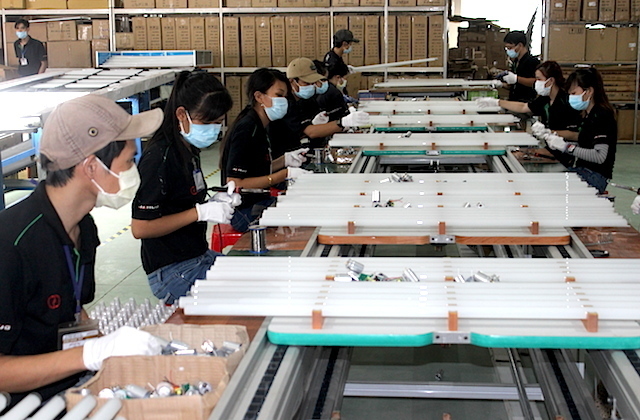Vietnam: Hard-hit bsinesses still paying high interest on loans
The latest Covid-19 outbreak has pushed enterprises into new difficulties at a time when it is nearly impossible to access cheap capital sources.
The State Bank of Vietnam (SBV) has repeatedly asked commercial banks to slash lending interest rates in order to help clients overcome difficulties caused by the pandemic. However, it is still difficult to access preferential loans from banks.
The general director of a wooden furniture manufacturer in HCM City said he still cannot access any funds from the preferential loans programs launched by banks.
In order to get loans at an interest rate of 7 percent per annum, businesses have to satisfy a lot of requirements, including criteria that is difficult to meet in current conditions.
A mechanical engineering company in HCM City said it is a loyal client of Vietcombank and is listed among good businesses with high credit ranking, subject to preferential loans, but it still has to pay 8.7 percent per annum for 6-month loans.
Vietcombank is one of the big four state-owned banks which are offering lending interest rates that are lower than rates from joint stock banks.
Nguyen Toan Thang, Director of Toan Thang Co Ltd in Hanoi, specializing in mechanical engineering products, said his business can only borrow money from small joint stock banks at relatively high interest rates, while preferential loans offered by large banks are inaccessible because of complicated procedures and requirements.
Most businesses can only get short-term loans, and the average interest rate is 9 percent per annum for six-month loans.
A plastics manufacturing company in Hanoi confirmed that the interest rates offered by banks are 9 percent or higher, which is unbearable for businesses in current conditions. Meanwhile, the interest rate of an older loan is 10.5 percent per annum and banks refuse to cut the rate.
While businesses complain about difficulties in production, most commercial banks reported a profit increase of 55-65 percent in the first quarter of 2021. This was attributed to the big gap between deposit and lending interest rates.
| While businesses complain about difficulties in production, most commercial banks reported a profit increase of 55-65 percent in the first quarter of 2021. This was attributed to the big gap between deposit and lending interest rates. |
At present, banks pay 3 percent on average for 3-month term deposit, 4-6 percent for 6-9 month deposits and 5.3-7 percent for 12 month deposits.
Meanwhile, they require high interest rates of 8.5 and 9 percent per annum for loans.
“While banks only have to pay 3-5 percent per annum for capital, they charge businesses 9-10 percent. The banks’ preferential credit packages are just an ‘exhibition’, which you can only visit and see, and cannot touch them,” a businessman said.
When will interest rates go down?
Nguyen Van Ket, Director of SKD Vietnam, said to borrow money from banks, businesses must have turnover and have collateral for loans, but they are now in difficulties because of the pandemic, and turnover is small. Therefore, it is very difficult to access bank loans at this time.
Businesses want easier access to preferential bank loans and further interest rate decrease.
Vo Tri Thanh, former Deputy Head of the Central Institute of Economic Management (CIEM), said the Covid-19 outbreak has had an adverse impact on businesses, pushing them into a deadlock. In such conditions, credit policies will play an important role in helping businesses overcome difficulties. Capital will help businesses restructure, and make investments to uograde infrastructure and technology to adapt to the new circumstances.
He has urged new, timely financial solutions to support enterprises, especially small and medium sized.
To Hoai Nam, Secretary General of the Vietnam Small and Medium Enteprrises Association, said that capital determines 45-50 percent of businesses’ success.
He has proposed that the State Bank of Vietnam create favorable conditions for businesses to access preferential credit packages by simplifying lending procedures.
Economists said that as the outbreak has reoccured, capital sources among the public are no longer profuse and banks’ capital mobilization growth rate is lower than the lending growth rate. As a result, some banks are facing liquidity problems, which means that the deposit interest rate is under pressure to go up.
Analysts believe a new interest rate floor will be set in the second quarter.
The economy is also under pressure as the inflation rate is likely to increase. If the inflation rate does increase, it will push up deposit interest rates, causing banks to refuse to ease lending interest rates.
As such, the hope for accessing cheap capital seems to be far away.
Tran Thuy
Source: https://vietnamnet.vn/en/feature/hard-hit-bsinesses-still-paying-high-interest-on-loans-739577.html


 English
English




